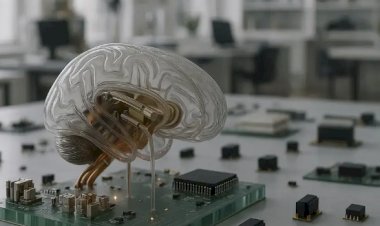AI for Content Creation: Reshaping the Landscape

AI Is the latest entrant in content creation, redefining how businesses generate and market content. Once a human-dominated field, writing articles for deep learning personalization sees AI as an essential partner for production while maintaining quality.
AI applications in content started with grammar and spell-check tools and recommendation engines. Now, AI, in the form of GPT and Midjourney, is used to write content and generate images and videos with minimal human intervention. Content creators are leveraging AI to generate blog posts, social media captions, and video scripts, reducing the time and cost involved in content production.
This article will talk about AI’s contribution to the content landscape.
What is AI Content Creation?
AI content creation refers to the use of AI-powered tools that leverage ML, natural language processing (NLP), and deep learning algorithms to assist creators. These tools assist creators by suggesting topics, generating outlines, and editing based on given prompts. One of AI’s biggest strengths is personalization. AI analyzes user behavior to recommend the most relevant content to the audience. It can tailor the messaging to specific demographics, improving engagement and conversion rates.
How AI Optimizes Content Creation
Let’s take the example of AI in blog writing. Traditionally, writing a well-researched blog post requires hours of brainstorming, researching, drafting, and editing. But with AI such as ChatGPT, you can
- Generate Topic – AI analyzes trending topics and suggests relevant content ideas based on search trends and audience interests.
- Research Assistance – AI scans data to provide key insights, statistics, and references, reducing research time.
- Draft the Content – AI generates structured content with proper grammar, coherence, and readability, acting as a first draft that writers can refine.
- Optimize SEO – AI tools suggest keywords, meta descriptions, and formatting tips to ensure the content ranks well on search engines.
- Editing & Enhancement – AI-powered grammar and style checkers, like Grammarly, refine the content for clarity, conciseness, and engagement.
How AI is Transforming Content Creation
Here’s how AI is transforming content creation.
1. Automating Content Generation
AI tools like ChatGPT and Jasper can generate blog posts, whitepapers, and reports, optimizing the time and effort needed for content creation.
Example: A SaaS company uses AI to generate in-depth product guides and case studies, ensuring a steady flow of educational content for clients.
2. Enhancing Personalization
AI analyzes customer data to create personalized content tailored to specific audiences, improving engagement.
Example: A marketing automation platform uses AI to personalize email campaigns based on user behavior, increasing open and click-through rates.
3. Optimizing SEO and Search Rankings
AI tools like Clearscope and Surfer SEO help optimize your content by suggesting relevant keywords, improving readability, and enhancing structural features.
Example: A cybersecurity firm uses AI SEO tools to ensure its blog content ranks higher on Google, attracting more organic traffic.
4. Generating AI-Powered Visuals & Videos
AI design tools like Canva AI and Runway generate visuals, infographics, and even short marketing videos reducing the need for expensive design subscriptions.
Example: A financial services firm uses AI to create automated explainer videos on investment strategies, making complex topics easier to understand.
5. Automating Content Curation & Distribution
AI helps you discover relevant content and schedule it for distribution across multiple platforms, ensuring consistent audience engagement.
Example: A digital marketing agency uses AI social media schedulers like Buffer AI to curate and post industry-relevant content, maintaining an active presence on LinkedIn, Twitter, and newsletters.
6. Improving Content Analytics & Performance Tracking
AI analytics tools provide insights into content performance, helping you refine your strategies for better results.
Example: A software company uses AI to analyze engagement metrics from whitepapers and webinars, adjusting future content based on audience preferences.
How AI Can Improve Content Marketing Strategy
Here’s how AI enhances content marketing across all aspects of a business.
1. Content Personalization & Audience Targeting
AI analyzes customer behavior and preferences to deliver personalized content that resonates with specific audiences.
Example: A cloud solutions provider uses AI-driven email marketing to send tailored whitepapers based on a prospect’s industry and interests.
2. AI-Driven Chatbots for Engagement
AI chatbots respond instantly to customer queries, guiding them through content like blogs, case studies, and product pages.
Example: A fintech company integrates an AI chatbot on its website to suggest relevant articles and reports based on visitor questions.
3. Predictive Analytics for Better Strategy
AI analyzes past performance to predict which types of content will perform best, helping you refine your marketing strategies.
Example: A logistics firm uses AI to analyze engagement trends and adjust its content calendar to focus on high-performing topics.
4. AI-Generated Visual & Video Content
AI tools create quality graphics, infographics, and videos, reducing production time and costs.
Example: A consulting firm uses AI-generated explainer videos to simplify complex industry trends for its clients.
Benefits of AI for Content Creators
Here are some key benefits of AI for content creators.
1. Enhanced Creativity & Idea Generation
AI helps content creators brainstorm ideas, generate headlines, and suggest new topics based on trends and audience preferences.
Example: A content strategist uses AI tools to analyze trending keywords and generate fresh blog ideas tailored to their target audience.
2. Improved Content Quality & Accuracy
AI-powered grammar checkers refine content by improving clarity, tone, and structure, ensuring quality output.
Example: A freelance writer uses AI tools like Grammarly to enhance readability and eliminate errors before publishing an article.
3. Data-Driven Insights & Performance Tracking
AI provides real-time analytics on content performance, helping creators refine their strategies for better engagement.
Example: A content manager uses AI analytics to track which blog topics drive the most traffic and adjust future content.
4. Cost-Effective Content Production
AI reduces the need for content resources by automating repetitive tasks, making content creation more budget-friendly.
Example: A small business leverages AI to generate marketing copy, saving money on hiring multiple writers.
5. Multilingual Content Creation
AI-powered translation tools enable content creators to reach global audiences by generating content in multiple languages.
Example: A travel blog uses AI to translate articles into different languages, expanding its international readership.
Challenges for AI in Content Creation
Here are some key obstacles businesses and content creators face when using AI for content generation.
1. Lack of Human Creativity & Emotional Depth
AI can generate data-based content but struggles with emotions and storytelling. Human writers bring unique perspectives, humor, and cultural nuances that AI often fails to replicate.
Example: An AI-generated blog post might be grammatically perfect but lacks the emotional connection to engage readers deeply.
2. Quality & Accuracy Issues
AI relies on existing data to create content, sometimes leading to inaccuracies, outdated information, or misleading facts. Without human oversight, AI-generated content may spread misinformation.
Example: A financial advisory firm using AI to generate market reports must fact-check the content to ensure accuracy before publishing.
3. SEO & Algorithm Dependency
AI-generated content is often optimized for search engines, but over-reliance on algorithms can make content feel robotic or repetitive. Additionally, search engine updates can impact AI-driven SEO strategies.
Example: A SaaS company using AI for SEO-optimized blogs may find that Google’s algorithm updates reduce its rankings if the content lacks originality.
4. Ethical Concerns & Bias in AI-Generated Content
AI models learn from existing data, which can sometimes contain biases. AI-generated content may reinforce stereotypes or present biased perspectives if not carefully monitored.
Example: A hiring platform using AI to generate job descriptions must ensure the language is inclusive and free from gender or cultural bias.
5. Plagiarism & Copyright Issues
AI can generate content that closely resembles existing material, raising concerns about plagiarism and intellectual property rights.
Example: A marketing agency using AI to generate social media captions must check for originality to avoid legal issues.
6. Over-reliance on Automation
While AI can streamline content creation, excessive dependence on automation can reduce human involvement, leading to generic content.
Example: A B2B company using AI-generated email campaigns may experience lower engagement if the content lacks a personal touch.
7. Integration Challenges with Existing Workflows
AI tools must seamlessly integrate with existing CMS, marketing platforms, and workflows. Poor integration can slow down processes instead of improving them.
Example: A publishing house adopting AI for content editing may face compatibility issues with its existing editorial software.
The Future of AI Content Creation
The future of AI in content creation will be an exciting journey that will reshape how we produce, consume, and interact with digital content. The following article will list the best AI tools for content creation in 2025.
AI is already facilitating industries like marketing, journalism, and entertainment, with constant demand for fresh content. The next phase of AI-driven content will see even more hyper-personalization, where AI will generate content and predict and adapt to audience preferences in real-time. Moreover, ethical AI development will become a key focus, ensuring that AI-generated content remains authentic, unbiased, and aligned with human creativity. As AI continues to learn from data, it will refine storytelling, enhance brand messaging, and drive innovation across industries.
Conclusion
The future of content creation will involve collaboration between humans and AI. The technology will amplify creativity, enabling creators to produce engaging, personalized, and diverse content. It will empower creators to work smarter, not harder, and offer new ways to connect with the audience. AI, as a key player, creates endless possibilities, making it exciting for creators and businesses alike.




















